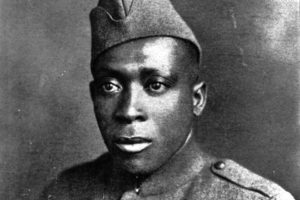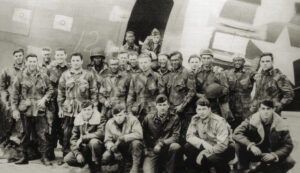 In his 1928 book Rank and File Theodore Roosevelt Jr., American Legion co-founder and son of the former president, rated Henry Johnson one of the five bravest U.S. soldiers in World War I. But not until June 2, 2015, did Johnson receive proper recognition from his country, when President Barack Obama posthumously awarded him the Medal of Honor.
In his 1928 book Rank and File Theodore Roosevelt Jr., American Legion co-founder and son of the former president, rated Henry Johnson one of the five bravest U.S. soldiers in World War I. But not until June 2, 2015, did Johnson receive proper recognition from his country, when President Barack Obama posthumously awarded him the Medal of Honor.
Born just before the turn of the 20th century in Winston-Salem, N.C., Johnson was working as a train porter in Albany. N.Y., in 1917 when he enlisted in the Army. He was assigned to Company C, 15th New York National Guard Regiment, an all-black unit soon redesignated the 369th Infantry. At a time when black soldiers were generally confined to manual labor, the men of the 369th (aka “Harlem Hellfighters”) were lent to the hard-strapped French Fourth Army. Wearing French helmets and carrying French weapons, they entered combat near Sainte-Menehould, France.
There in the predawn darkness of May 15, 1918, Johnson and fellow “Hellfighter” Needham Roberts were on sentry duty when they came under German sniper fire. Anticipating an attack, the privates readied a box of 30 hand grenades for quick use. Johnson soon heard the wire near his position being cut and hurled a grenade. He then told Roberts to inform the French commander what was happening. Roberts set out, but as enemy rifle fire picked up, he turned back to the dugout to help Johnson. He made it back, but not before being badly wounded in the arm by shrapnel. Too injured to use a rifle, he instead handed grenades to Johnson, who hurled them at the enemy.
By the time the pair used up their grenades, Johnson too had been wounded, struck in the head by bullets. Regardless, he kept firing his rifle, absorbing more enemy rounds in his side and hand, until his French rifle jammed. As the Germans overran his position, Johnson swung his jammed rifle like a club until the stock shattered. At that moment the young American took a blow to the head and went down. As two Germans sought to drag away Roberts (standard practice for intelligence purposes), Johnson pulled his sole remaining weapon, a machete-like bolo knife, leaped to his feet and charged back into the fray.
“Each slash meant something, believe me,” Johnson later said.
He cut down two of the enemy with his bolo knife, took a bullet to the arm, stabbed another German who had come up behind him and then dragged Roberts away from his captors. Only when the surviving enemy soldiers took to their heels did Johnson finally collapse. French reinforcements arrived to find him unconscious.
Johnson arrived at a field hospital with 21 injuries, including bullet and stab wounds to his head, torso, right arm and left leg, and his left foot had been shattered. Observers later determined he had repulsed a German raiding party, killing four of the enemy and wounding upward of a dozen more.
“There wasn’t anything so fine about it,” the self-effacing private recalled. “Just fought for my life. A rabbit would have done that.”
Nicknamed “Black Death” by his comrades, Johnson received the Croix de guerre, France’s highest military honor, with a bronze palm and star. But U.S. awards were lacking until President Bill Clinton posthumously awarded him the Purple Heart in 1996, and Congress granted him the Distinguished Service Cross in 2002.
Johnson died in his 30s in 1929 in Washington, D.C., and is interred at Arlington National Cemetery.
First published in Military History Magazine’s March 2017 issue.
Originally published in the August 2014 issue of Wild West. To subscribe, click here.





